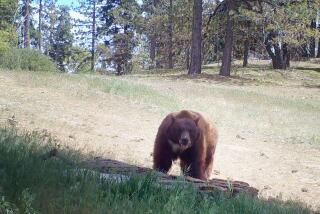Team-player chimps may shed light on origins of human cooperation
Just like enterprising humans, chimpanzees can be good team players to achieve their goals, according to a new study. The findings, published in Biology Letters, give a glimpse into the possible origins of human cooperative behavior.
With the lure of a juicy grape before them and two specialized tools in hand, chimps were able to work in pairs and free the fruit from a complex trap, according to a pair of European researchers working at the Sweetwaters Chimpanzee Sanctuary in Kenya.
“Chimpanzees not only coordinate different roles, but they also know which particular action the partner needs to perform,” the authors wrote, arguing that “many of chimpanzees’ limitations in collaboration are, perhaps, more motivational than cognitive.”
Researchers have debated whether chimps can work cooperatively for common purpose. Some have described their group hunts in the wild as coordinated, while others looking at different populations have described them as haphazard.
To answer this question, 12 chimps were paired up and placed around a sealed, see-through box with eight grapes in it. In order to get the grape out, one chimpanzee would have to insert a thin stick through a slit in the back and rake the grapes over to a platform, which the second chimp would cause to tilt using a thick stick – thus dropping the grapes into reach for both teammates.
One chimp was given both tools, and then had to decide what to do with them. Some of the chimps were quicker studies than others. However, once a pair successfully shared a tool once, they transferred tools 97% of the time and successfully grabbed the grapes in a full 86% of the trials, the authors said.
“Although there were great individual differences regarding how quickly subjects started transferring tools (and some subjects seemed to rely on experiencing receiving a tool from the partner to start transferring tools themselves), after doing it once, they did it all the time,” the authors wrote.
Follow me on Twitter @aminawrite.







